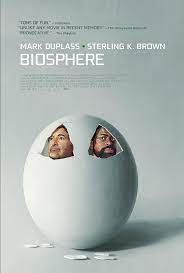
BIOSPHERE
US, 2023, 106 minutes, Colour.
Sterling K.Brown, Mark Duplass.
Directed by Mel Eslyn.
After watching Biosphere, audiences will have all kinds of conversations, all kinds of leads from this unexpected scenario. While reviews can be guides as to whether to see a film or not, many reviews are better read after the audience has seen the film. So, a suggestion that it might be best to see the film as it is rather than through the reviewer’s interpretation. That said, potential audiences alerted, here are some reviewer reflections.
Richard Matheson wrote an apocalyptic story, The Last Man on Earth (some film versions), touches of horror. Biosphere raises the question of The Last Two Men on Earth!
This is a science-fiction film. And all science-fiction films offer a variety of hypotheticals, scientific possibilities (and impossibilities), scenarios that range from the creation of life to space exploration. And, as with this one, they can be combined with apocalyptic possibilities, the end of the world. But, already these comments make Biosphere seem more seriously-toned than it is – though, ultimately, it raises all kinds of serious and depth questions. However, there is a comic and light tone throughout the film as we are introduced to a former President of the United States (obviously not one of the great statesman) and his science advisor who, in view of world destruction, has built a very comfortable pod for their survival, as many as the comforts of home as they can, help with them pass the years they have spent inside the pod. They have been friends since childhood, though he Republican and the scientist Democrat, and they share memories from their past, and banter through their survival, jogging, computer games, watching Lethal Weapon, experts on Super Mario…
So, while it has been apocalyptic, and there is a menacing greenlight outside the pod, this begins is a cheerful story about friendship, Sterling K.Brown, Ray, African-American scientist, intelligent, a reader, inquiring, contrasting with Mark Duplass, Billie, the rather affable layabout ex-president.
We are made alert because Billy starts to read Kiss of the Spider Woman, not understanding the gender issues the novel raises.
Then the screenplay moves to issues of evolution, the death of the male fish that they have been keeping, Sam, to mate with Diana, to keep them supplied with food. Diana dies. And the discovery of what can happen in this evolutionary situation for survival, Sam transforming to female. And, our immediate initial wondering: can this be true for humans and the prolonging of the human race. In fact, it does not take too long before this theme moves into action, Billy transforming, Ray puzzled, challenges the scientist to investigate. Which, of course, then leads to the issue of reproduction, pregnancy.
And the screenplay does take us all the way, challenging our ordinary stances, making us wonder about evolution and the future, and always the underlying contemporary questions about gender identity, gender relationships, love, the erotic, friendship…
The film takes place on the one set, rather claustrophobic in its way, is very much a dialogue-oriented screenplay, literature and media references, extensive vocabulary, which means that it offers an interesting, provocative, emotional and intelligent challenge.
- The title? Space? The enclosed pod? Life, survival?
- The tone of the film, comic, satiric, serious, science, evolution, gender, male-female…?
- The set, enclosed, the biosphere, main room, bedroom, the circuit for jogging, cooking, the library, television, computer games…?
- The audience gradually learning of the situation throughout the film, the past president, his science advisor, their friendship since childhood, different political affiliations, the responsibility of the president, destruction of the world, the building of the pod, a refuge?
- The character of Ray, African-American, science background, Democrat, advisor to the President, scientific investigations, building the pod? Strong masculine identity? The relationship with Billy, childhood, the presidency, the catastrophe, living the years in the pod, to bachelors, comforts?
- The character of Billy, as a child, friendship with Ray, audiences accepting him as President, the poster, soft character, accepting the situation, the years with Ray?
- The science fiction element? Hypotheticals? The apocalyptic scenario? Credible? The plausibility of the plot, survival?
- The issue with the fish, theories of evolution, the male transforming to female? Audiences anticipating the change with Ray and Billy? Billy proposing the theory? Ray’s response? The gradual transformation for Billy, genitals, the ceremony with the penis, the female transformation, vagina, breasts, the psychological transformation, female behaviour (stereotypical?) Sensitive, kitchen, language, treatment of Ray?
- The issue of pregnancy, the discussions about impregnation, discussions of reproduction, without erotic background, the final solution, the cover, the whole, Ray providing the semen, the effect on the two, the relationship, affection? The months of the pregnancy, the change in Billy, Ray and his responses? Setting up house?
- The mystery of the green light, his presence, eventually seeming to attack, the holes, the cloth, the container for the fish, the death of the fish? The prospects of starving?
- The question of whether there are other pods, other survivors? Coping with the crisis, the future, lack of food, the issue of bringing a child into this world?
- The sudden ending of the film, leaving everything to the audience to reflect on and discuss?